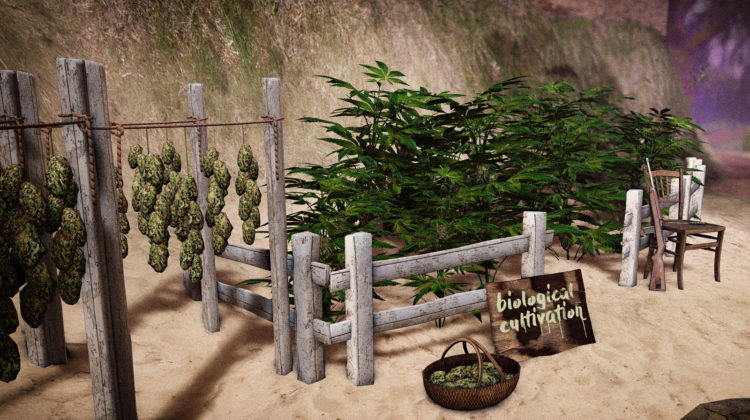
Display of a cannabis plantation. Photo credit: Ginger Chevalier/flickr.
Since the start of this year, cannabis farmers in California endured yet another increase to the cannabis’ cultivation tax.
The costs have proved burdensome. In fact, one cannabis grower from the Sonoma County, Doug Gardner, had to resort to uprooting an entire acre of cannabis plants to avoid paying roughly $100,000 in taxes, the Sonoma Index-Tribune reported.
Combined with other costs, small businesses will only make enough to break even – some even lose money. However, on February 9th, California lawmakers held a virtual press conference with the Save California Cannabis Coalition to address these concerns.
Inaction By Lawmakers
In 2016, the then Lieutenant Governor Newsom supported the passing of Proposition 64, legalizing cannabis for adults 21 and over.
According to CalMatters, since Newsom’s campaign for the legalization of cannabis, he has moved on to other issues such as health care, homelessness, and early childhood education. To cannabis businesses, Newsom ignored their problems and let them build up to where they are now.
Co-founder of Flow Cannabis Co., Michael Steinmetz, said the governor “championed our message and he rode our coattails all the way to the top,” Steinmetz adds. But now, “we feel that he has turned his back in some capacity.”
As of now, the legal market for cannabis is losing out to black market dealers.
Taxes and fees have only increased costs for business to operate. This has particularly stifled small operators. According to the California Department of Tax and Fee Administration (CDTFA), the cultivation taxes for every ounce of cannabis have risen by roughly 5% since 2020. In turn, consumers are also paying higher prices for legal cannabis products.
Ingrid Tsong, who runs Beija Flor Farms in Mendocino County, California with her husband, Jonathan Wentzel, told CalMatters that the cost to produce a pound of cannabis has risen. It is $460 when the same amount is currently being sold for $300 (compared to $800 last year).
These costs are proving to be too high for both operators and their customers.
As Politico reports, a majority of the state’s cannabis sales are underground. “[…] California’s strict regulations have led most industry operators to close shop, flee the state or sell in the state’s illegal market that approaches $8 billion annually, twice the volume of legal sales.”
High Taxes and Other Factors Make Legal Weed More Expensive
Due to the high taxes, in December of last year, cannabis business owners posted a letter to Newsom on Change.org. In it, they called for tax cuts and the expansion of retail access.
“Excessive taxation, which compounds across the supply chain, makes our product 50% more expensive at retail than the illicit market,” the petition read.
In addition to high fees, the lack of access to legal cannabis is stifling. Since California officially welcomed retail recreational sales in 2018, most of the state has remained without access to legal cannabis. For example, according to an LA Times report, nearly 80% of the state’s 500 municipalities have banned retail cannabis sales. As a result, the underground market continues to thrive while the legal one suffers.
They also highlight the impact the taxes have on Black, Brown, and Latinx communities, especially in terms of jobs opportunities. It also affected public health; that’s because illegal cannabis products are not tested for safety. These underground sales make up 75% of all cannabis consumed, according to the petition.
Drug War 2.0
Last month, NBC News reported on a protest outside of the State Capitol in Sacramento. At it, Amber Senter, founder of Supernova women — a socially equity-focused nonprofit — gave a dire warning.
“We’re here today because the craft cannabis industry here in California is in crisis and on the brink of collapse,” she said.
“Not only has the state fallen short in promises to right the wrongs inflicted upon Black and brown communities impacted by the war on drugs, but it has also perpetuated regressive war-on-drugs 2.0 policies through oppressive taxation, which must end,” NBC reported. “This is our cry and plea for help.”
These protests did find success in calling lawmakers to take action. According to Courthouse News, Assemblymembers Rubio and Cristina Garcia have assured in the recent press conference that legislation was in progress to provide statewide tax relief to growers and retailers. On February 15th, Senator Mike McGuire introduced a bill to remove the cultivation tax and increase the excise tax instead. This proposal moves the tax to the retail sales, rather than when the cannabis plants are harvested. If passed, the bill will go into effect in July of this year.
For the tax cut to go into action, a two-thirds vote is needed in the state Senate and Assembly.
Local Tax Relief Available
In the meantime, counties and cities are already taking action.
In fact, the San Francisco Board of Supervisors voted to suspend local taxes on cannabis sales. Long Beach and Humboldt, Monterey, Lake and Sonoma counties are following suit.
According to the North Coast Journal, the Humboldt County Board of Supervisors had extended bill payments to be due in September and included allowing installment payments while reducing next year’s tax bills by 85% percent.
Post from @hcga_humboldt on Instagram.
On the other hand, Bloomberg reported Long Beach had opted to increase hours of operation for cannabis retailers when the city council had previously proposed tax increases in 2020. This has allowed struggling cannabis operators to boost their sales.
Other city councils, like that in San Diego, are also lowering taxes, such as on production facilities. In turn, officials hope this will increase the amount of businesses in operation, and help operators stay afloat while they await statewide action.


Leave a Reply